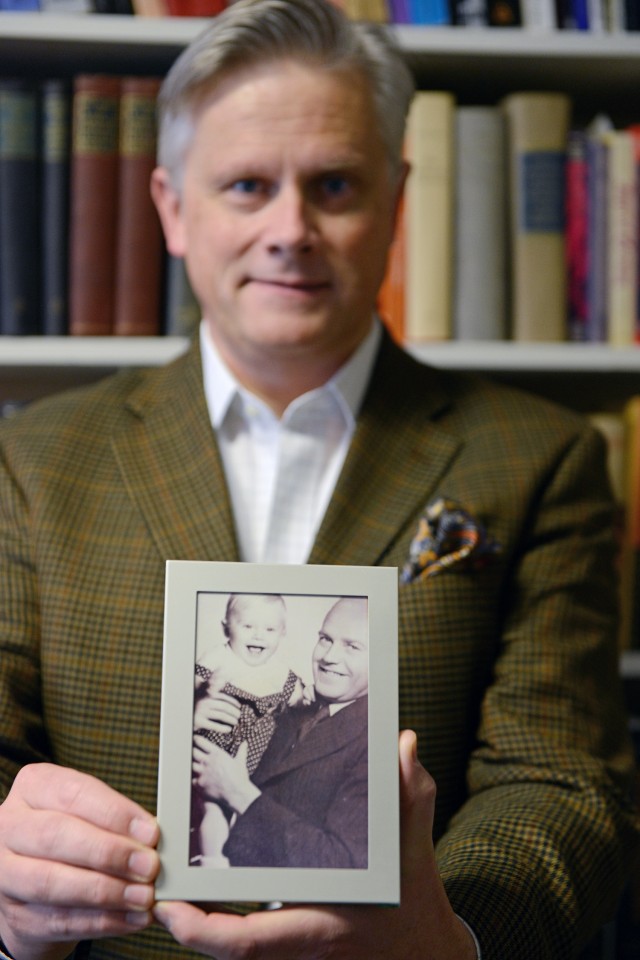Grimmer-Solem’s Research Leads Germany to Order Base Re-Named


In response to research by Associate Professor of History Erik Grimmer-Solem, the German air forces have decided to rename a base currently named after a celebrated general known as an “anti-Nazi” in the years following World War II. The base is currently called after Gen. Hans von Sponeck, who was court-martialed and imprisoned for refusing to follow Hitler’s orders during a major Soviet counteroffensive on the Crimean Peninsula in 1941.
Recently, the German government announced in the Bundestag that the air forces had formally approved the name change in June, based in part on Grimmer-Solem’s work, published early this year in the journal Militärgeschichtliche Zeitschrift, and national media reports about that work. A final agreement on renaming the base is pending between the Luftwaffe and the nearby city of Germersheim, and local citizens have protested the name change.
“I knew that my research had the potential to stir up some controversy, but the speed with which a national debate and parliamentary discussion formed around the issue really caught me by surprise,” said Grimmer-Solem. “My findings hit a nerve. An official effort is now underway to assure that other military installations don’t mistakenly honor compromised officers. Still, the fact that there’s a sizable citizen initiative underway to keep the old name of the military base reveals just how divisive this topic still is in Germany.”
Grimmer-Solem’s grandfather, Dr. Odd Solem, was arrested by the Gestapo along with two other Norwegians during the German occupation of Norway in the summer of 1940. He was sentenced to death by a German military tribunal, but had his sentence reduced to a prison term in Germersheim. There, he met and befriended von Sponeck, whose refusal to follow orders likely saved the lives of thousands of soldiers. Von Sponeck was ultimately executed on the orders of Heinrich Himmler following the failed assassination attempt on Hitler in July 1944, while Solem and the other prisoners narrowly escaped an SS execution squad and survived the war.
In the decades since the war, von Sponeck has been celebrated in Germany for his moral courage, with the air force base, city streets and other monuments named after him. Along with the tales of von Sponeck’s kindness toward Grimmer-Solem’s grandfather, the general’s unusual reputation as a heroic “anti-Nazi” sparked Grimmer-Solem’s interest. Since he regularly teaches a course on Nazi Germany and knows the literature on the role of the Wehrmacht (Germany’s unified armed forces from 1935-45) in war crimes in the Soviet Union, he began to have questions about von Sponeck’s career when it became clear that the general had commanded units of the German 11th Army during Operation Barbarossa, the invasion of the Soviet Union, in the summer and fall of 1941.

War crimes and crimes against humanity are well documented within the area of operation of the 11th Army. Grimmer-Solem undertook a detailed investigation of von Sponeck’s military career in the German Military Archives in March 2013 and discovered evidence that the general’s record was far from spotless: The records showed close cooperation between the military unit von Sponeck commanded and the SS in committing numerous war crimes and crimes against humanity in the southern Ukraine and Crimea in 1941. Two days before the invasion of the Soviet Union in June 1941, General von Sponeck ordered that any Jews among Red Army prisoners of war should be identified and specially segregated. Once the invasion was underway, his general staff warned soldiers to view all Jewish civilians as potential spies and to take harsh measures against suspected saboteurs, including women and children, thus enabling the Nazi regime’s war of destruction against “Jewish-Bolshevism.” In early October 1941, von Sponeck personally ordered that his soldiers work closely with SS mobile killing units by identifying suspicious civilians and handing them over to the SS.
“Many elderly Germans have a hard time coming to terms with the scale of the Wehrmacht’s involvement in the Holocaust as it implicates them, their siblings and their parents,” Grimmer-Solem said. “You have to remember that millions of German soldiers served on the Eastern Front. It’s also hard for them to square the charming, affable and cultivated personality of General von Sponeck with mass shootings of Jewish civilians and Soviet POWs in the Ukraine. The thing to remember is that it wasn’t just a small band of Nazi fanatics that made genocide on that scale possible but the active and passive involvement of many ordinary people.”
The lesson to be drawn from the von Sponeck story is a universal one, Grimmer-Solem said. “The shell of what we call civilization is thin, and under conditions of emergency or war, it’s disturbingly easy to remove certain groups from our orbit of concern and to justify ruthless behavior that would otherwise be condemned as criminal, especially if those groups have already been targeted by official propaganda as a national threat.”

